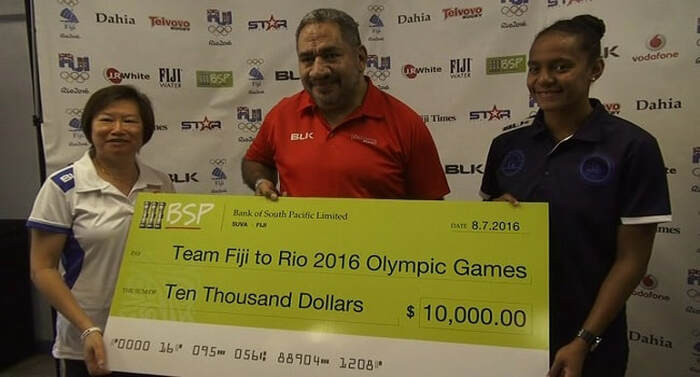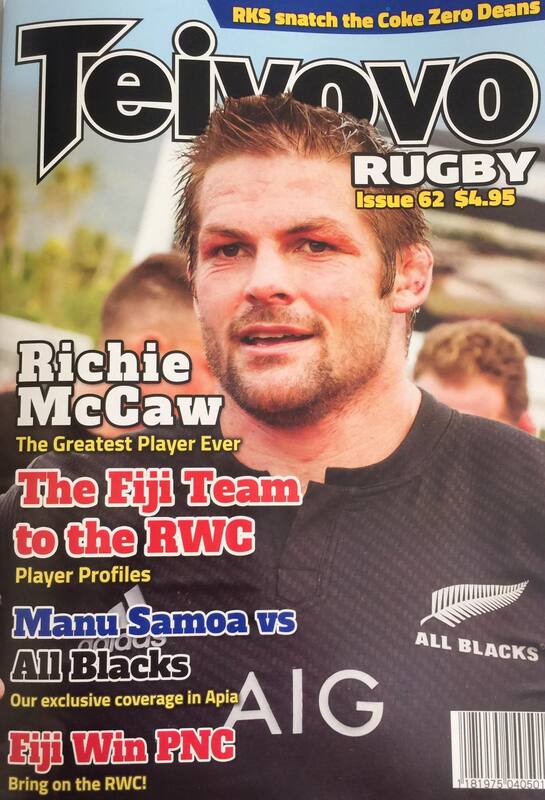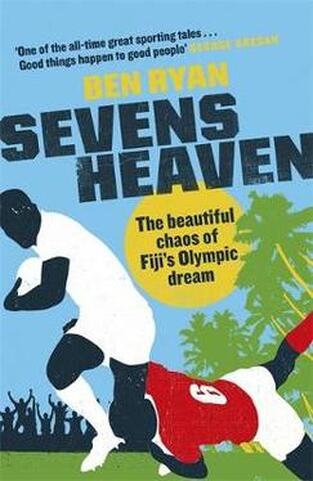
Culden Kamea’s Teivovo Rugby magazine was a key fundraising supporter of Team Fiji for the Rio Olympics and was the exclusive distributor in Fiji of Ryan’s book Sevens Heaven. In the book, Ryan describes Kamea as the person who first took him outside Suva and Lautoka to look for prospective sevens talent
A Fijileaks Exclusive
The man who introduced rugby league to the Pacific in the early 1990s has emerged as one of the key players in the bidding process for a ‘Pasifika’ rugby team to join Super Rugby Aotearoa for season 2021 and beyond.
In a written response to Fijileaks, Culden Kamea confirmed he and Tony Ah Koy, whose family holdings have investments in Fiji, Samoa and Papua New Guinea, have teamed up with investor connections in New Zealand and will lodge a Super Rugby bid by the deadline set by New Zealand Rugby this coming Friday.
‘Everything that I hold dear as a “rugby coconut” of long-standing, tells me that rugby in the Pacific has this once in a lifetime window to come together: we must get this Super Rugby bid right for future generations.
‘Fiji, Samoa and Tonga have been on the sidelines of professional rugby union since the game went professional 25 years ago and we have all paid a dear price for that.
‘This is our one real chance to come together as a Super Rugby franchise based here in the Pacific for the benefit of all of us in the Pacific,’ said Kamea.
As a thirty-year-old, Kamea took on the then-fiercely amateur rugby establishment in Fiji when he recruited key players from the Fiji team that won the 1990 and 1991 Hong Kong Sevens, including Noa Nadruku who would become a legend with the Canberra Raiders, Joe Rabele, the current coach of the Fiji Bati, and Eddie Waqa, father of NRL Premiership winner Sisa, and took them to the Nissan World Sevens in Sydney in February 1992.
Other players who joined Kamea on that epic trip to Sydney included brothers Alifereti Dere and Pauliasi Tabulutu, Niko Baleiverata, Pio Kubuwai, Nemani Matirewa, and former Wallaby Acura Niuqila. The father of NRL superstar Jarryd Hayne, Fiji-born Manoa Thompson, played for Kamea at Fiji’s first outing in the Rugby League World Cup in 1995.
Kamea was given a life ban by Fiji Rugby Union for his trouble, but all was forgiven a decade later when he was invited to join the FRU as a board member by which time rugby union had turned professional.
Kamea, who has both Fijian and Tongan roots, said he sees Super Rugby and Rugby League as two sides of the same moral issue: ‘In the early 1990s so much was expected of those players, so much income was being generated on the back of their talent, yet they received absolutely nothing - not even complimentary tickets.
‘In the Pacific, where we play this great game, player welfare is still the most important issue, for the players themselves, their immediate and their extended families and their wider communities.’
‘Now Pacific rugby league players are some of the most keenly sought-after players in the NRL,’ said Kamea, who keeps across both codes as publisher of Teivovo Rugby magazine and most recently organized the Uprising Fiji International 7s tournaments.
‘Sadly this same question of fair play for those boys that launched rugby league in Fiji nearly three decades ago is still here but the problem is in rugby union. And it’s linked to the fact the Pacific Islands were left out of Super Rugby, forcing our best players to play overseas just to make a living.’
Kamea confirmed that for 2021 his bidding group would follow the ‘biosecurity’ stipulations laid down by NZR and propose a team that would be based in New Zealand for that first season.
‘But from 2022 onwards our principle is in the Pacific, for the Pacific and by the Pacific,’ said Kamea.
He confirmed that his group had had positive discussions with the Sir Bryan Williams-led Moana Pasifika group, their bid details of which were revealed in the New Zealand media over the weekend.
‘Sir Bryan is a rugby legend and the people carrying the Moana Pasifika bid forward are all exceptional in their dedication to doing what is best in the interests of their people and communities,’ said Kamea.
Kamea said that discussions with the Fiji Rugby Union and Oceania Rugby had been positive and were on-going.
The man who introduced rugby league to the Pacific in the early 1990s has emerged as one of the key players in the bidding process for a ‘Pasifika’ rugby team to join Super Rugby Aotearoa for season 2021 and beyond.
In a written response to Fijileaks, Culden Kamea confirmed he and Tony Ah Koy, whose family holdings have investments in Fiji, Samoa and Papua New Guinea, have teamed up with investor connections in New Zealand and will lodge a Super Rugby bid by the deadline set by New Zealand Rugby this coming Friday.
‘Everything that I hold dear as a “rugby coconut” of long-standing, tells me that rugby in the Pacific has this once in a lifetime window to come together: we must get this Super Rugby bid right for future generations.
‘Fiji, Samoa and Tonga have been on the sidelines of professional rugby union since the game went professional 25 years ago and we have all paid a dear price for that.
‘This is our one real chance to come together as a Super Rugby franchise based here in the Pacific for the benefit of all of us in the Pacific,’ said Kamea.
As a thirty-year-old, Kamea took on the then-fiercely amateur rugby establishment in Fiji when he recruited key players from the Fiji team that won the 1990 and 1991 Hong Kong Sevens, including Noa Nadruku who would become a legend with the Canberra Raiders, Joe Rabele, the current coach of the Fiji Bati, and Eddie Waqa, father of NRL Premiership winner Sisa, and took them to the Nissan World Sevens in Sydney in February 1992.
Other players who joined Kamea on that epic trip to Sydney included brothers Alifereti Dere and Pauliasi Tabulutu, Niko Baleiverata, Pio Kubuwai, Nemani Matirewa, and former Wallaby Acura Niuqila. The father of NRL superstar Jarryd Hayne, Fiji-born Manoa Thompson, played for Kamea at Fiji’s first outing in the Rugby League World Cup in 1995.
Kamea was given a life ban by Fiji Rugby Union for his trouble, but all was forgiven a decade later when he was invited to join the FRU as a board member by which time rugby union had turned professional.
Kamea, who has both Fijian and Tongan roots, said he sees Super Rugby and Rugby League as two sides of the same moral issue: ‘In the early 1990s so much was expected of those players, so much income was being generated on the back of their talent, yet they received absolutely nothing - not even complimentary tickets.
‘In the Pacific, where we play this great game, player welfare is still the most important issue, for the players themselves, their immediate and their extended families and their wider communities.’
‘Now Pacific rugby league players are some of the most keenly sought-after players in the NRL,’ said Kamea, who keeps across both codes as publisher of Teivovo Rugby magazine and most recently organized the Uprising Fiji International 7s tournaments.
‘Sadly this same question of fair play for those boys that launched rugby league in Fiji nearly three decades ago is still here but the problem is in rugby union. And it’s linked to the fact the Pacific Islands were left out of Super Rugby, forcing our best players to play overseas just to make a living.’
Kamea confirmed that for 2021 his bidding group would follow the ‘biosecurity’ stipulations laid down by NZR and propose a team that would be based in New Zealand for that first season.
‘But from 2022 onwards our principle is in the Pacific, for the Pacific and by the Pacific,’ said Kamea.
He confirmed that his group had had positive discussions with the Sir Bryan Williams-led Moana Pasifika group, their bid details of which were revealed in the New Zealand media over the weekend.
‘Sir Bryan is a rugby legend and the people carrying the Moana Pasifika bid forward are all exceptional in their dedication to doing what is best in the interests of their people and communities,’ said Kamea.
Kamea said that discussions with the Fiji Rugby Union and Oceania Rugby had been positive and were on-going.



